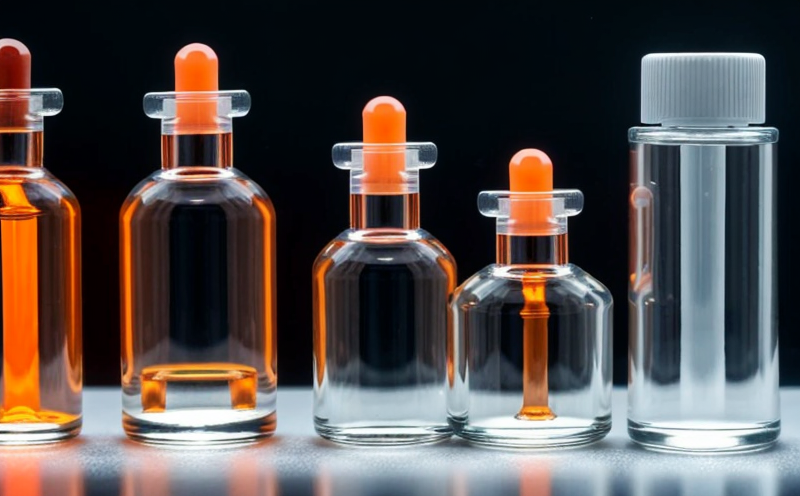DIN EN 17075 Water Quality Testing for Toxicity of Nanoparticles
The DIN EN 17075 standard is a pivotal method designed to evaluate the toxicity of nanoparticles in water. This testing protocol is essential for ensuring that nanomaterials are safe for their intended use and do not pose risks to human health or the environment. The methodology is particularly important as the application of nanomaterials continues to expand across various sectors, including pharmaceuticals, electronics, and environmental remediation.
Under this standard, testing involves assessing nanoparticle behavior in water at different concentrations. Specimens are prepared by dispersing nanoparticles into a solution, which is then exposed to various aquatic organisms over defined periods. The response of the organisms provides insights into the potential toxic effects of the nanomaterials. This approach ensures that any adverse impacts on ecosystems or public health can be mitigated.
The testing protocol outlined in DIN EN 17075 is comprehensive, covering all aspects from sample preparation to data analysis. It emphasizes the importance of precise measurement and control over experimental conditions to ensure reliable results. The standard also provides guidelines for selecting appropriate test organisms based on the specific characteristics of the nanomaterials being evaluated.
Testing parameters in this method include concentration ranges, exposure durations, and endpoints such as mortality rates, growth inhibition, and behavioral changes. These parameters are critical for understanding how nanoparticles interact with water systems and can inform risk assessment strategies effectively.
The instrumentation used in these tests includes advanced analytical equipment capable of detecting even the smallest concentrations of nanoparticles. High-resolution imaging techniques allow researchers to observe nanoparticle distribution within aquatic environments accurately. Additionally, bioassay systems equipped with sensors monitor physiological responses in real-time, providing valuable data on toxicity levels.
Reporting from DIN EN 17075 tests follows strict guidelines ensuring transparency and consistency across different laboratories worldwide. Results are presented comprehensively detailing test conditions, observed effects, and conclusions drawn regarding nanoparticle safety. This documentation serves as a vital resource for regulatory bodies, industry stakeholders, and researchers alike.
In summary, DIN EN 17075 plays an indispensable role in safeguarding public health and environmental integrity by providing robust methods to assess nanomaterial toxicity in water systems. Its implementation supports informed decision-making processes within industries handling or producing nanoparticles.
Benefits
The adoption of DIN EN 17075 brings numerous benefits, both for regulatory compliance and business operations:
- Enhanced Safety Standards: Ensures that nanomaterials meet stringent safety criteria before entering the market.
- Improved Reputation: Establishes a reputation as a responsible corporate citizen committed to environmental stewardship.
- Increased Market Access: Helps companies comply with international regulations, thereby expanding their global reach.
- Risk Mitigation: Provides early detection of potential hazards associated with nanomaterials usage.
By adhering to DIN EN 17075 standards, organizations demonstrate commitment to sustainable practices and responsible innovation, which is increasingly valued by consumers and investors alike.
Customer Impact and Satisfaction
Implementing DIN EN 17075 testing enhances customer trust through proven safety measures. Compliance with these standards reassures clients about the quality and reliability of products containing nanomaterials. This confidence fosters long-term relationships based on mutual respect and shared values.
Moreover, successful completion of DIN EN 17075 tests offers significant competitive advantages by positioning your company ahead of competitors who may not adhere to such rigorous protocols. It highlights your dedication to excellence and innovation, setting a benchmark for industry standards.
Customers benefit from knowing that they are working with partners committed to sustainability and safety. This aligns well with growing consumer demands for environmentally friendly products, enhancing overall satisfaction levels.
Use Cases and Application Examples
| Application Example | Description |
|---|---|
| Pharmaceutical Manufacturing | Evaluating nanoparticle-based drug delivery systems to ensure they do not harm aquatic ecosystems during wastewater discharge. |
| Environmental Remediation | Testing nanoparticles used in soil remediation projects for their potential impact on local water sources. |
| Consumer Goods Industry | Assessing the safety of nanoparticle coatings on packaging materials to prevent leaching into food products. |
| Electronics Manufacturing | Evaluating the environmental footprint of nanomaterials used in printed circuit boards for water-based soldering processes.
- Healthcare: Ensuring that medical devices incorporating nanomaterials comply with regulatory requirements concerning aquatic toxicity.
- Agriculture: Assessing the safety of nanoparticle formulations used in pesticides or fertilizers for their potential effects on nearby water bodies.
The wide range of applications underscores the importance of DIN EN 17075 testing across multiple industries. By addressing these diverse use cases, this standard contributes significantly to maintaining ecological balance and public health.





